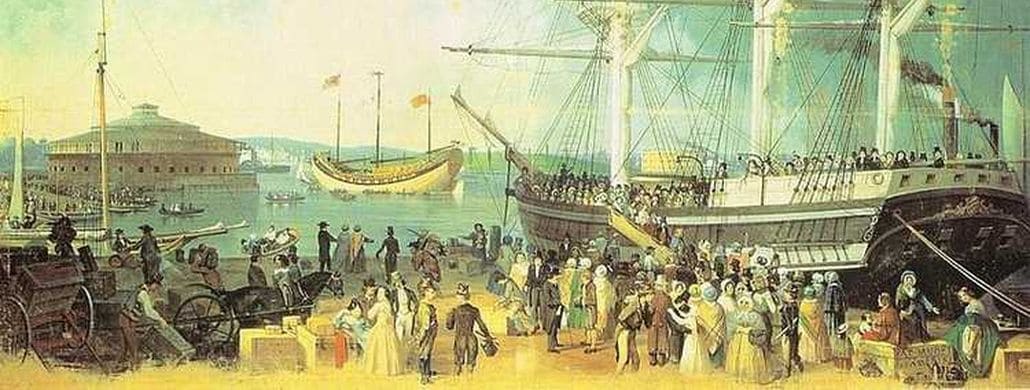
[America, 1850] Niklas and Heinrich Bergmann, now seasoned gentleman, stood on the pier in New York and waited for Lorenz. He had had just enough time in London to telegraph the name of his ship to the USA.
At last, they found him, but he was not alone. Clung to his hand, hidden behind his back were two emaciated children, behind them their mother stood shyly. “I’ve met them on the quay, they are from Ireland, and they do not know where to go,” Lorenz said. “You cannot imagine the misery on some ships. You don’t mind that we take them with us, do you?”
The Great Famine (1845-1848)
Heinrich and Niklas knew about the terrible famine in Ireland. Countless people were starving or dying from epidemic diseases after blasts of potato blight had ruined the potato harvests for years, and thereby destroyed their basis for life.
The English government could have helped, but things turned out differently. The starving Irish helplessly watched as British landowners shipped the few potatoes left to England. Even worse, they also exported he corn harvest that could have fed the Irish, along with dairy products. Actually, the penniless Irish could not afford them. Moreover, many in Westminster had no sympathy for the rebellious Irish. They argued that if they could not survive on the way they lived, then it was their fault . Free Trade meant the survival of the fittest.
Niklas and Heinrich were shocked. They had survived Napoleon’s disastrous Russian campaign and lived through hard years. However, to see the children and their mother, traumatized and just skin and bones, broke their hearts. Niklas did not find words. Then Heinrich, practical as ever, took up the little baggage they had. “Then let’s get you on the train home.”
Bad news from Germany
At home at the “Merry Dragon”, everyone pampered and encouraged Lorenz and his Irish protégés, so they gradually recovered from their ordeals. Only a couple of days later Niklas gently told him that they had received more bad news from Germany.
Hubert’s family, well known as democrats, had been denounced. The old gentleman was seriously ill, and they had emigrated to Brussels to live with Henriette’s relatives. Jean had urged Anni to take their children Sophie and Hans with them. As much as he would miss them, he wanted them to learn and become free spirits. Obviously, that was not possible in a country where even a kindergarten was considered suspicious.
Lorenz was devastated, and Niklas tried to encourage him. “Our family and friends in Germany, they fight for the same cause as you do. Granddad Hubert did so before you were even born. It is a good cause to fight for, don’t make it smaller by feeling guilty. The best you can do to honor them is to live a life by the same ideals here, and to help everyone to embrace their new lives in America and to thrive.”
Carl Schurz in the United States (1852, America)
One evening Harvey came back from Philadelphia and brought sensational news. “Would you believe who’s in town?” he cried, “Carl Schurz! This is an incredible story!
After the failed assault on the arsenal in Siegburg, Kinkel and Schurz had gone to Baden to join the Baden-Palatinate uprising. But the revolutionaries were no match for the Prussian troops. Kinkel was wounded and taken prisoner. At last, only the fortress at Rastatt remained in the hands of the revolutionaries. Schurz was enclosed there with others, the situation was hopeless and finally, they capitulated. The Prussians executed many revolutionaries by firing squad. As Schurz was a Prussian citizen, they would have executed him too. At the last moment he could escape through a sewer tunnel.
A year later he rescued Kinkel in a daring action from Spandau prison and fled with him to England. There he met his wife,. They decided to go to America, and now he’s here in Philadelphia.”
“I’d love to have a chance and see him,” Niklas Bergmann said, “he must be a daredevil.”
*Altogether, nearly one-eighth of Ireland’s entire population died of starvation and epidemic disease between 1846 and 1851. Hundreds of thousands Irish emigrated within a decade (1845-55).

Be the first to comment